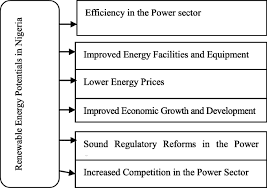


As Nigeria advances towards sustainable development and energy diversification, the focus on renewable energy sources, particularly solar energy, has become increasingly paramount. The country’s abundant sunlight offers a significant opportunity to harness solar power, which can play a crucial role in alleviating the persistent energy crisis and contributing to economic growth. However, the successful implementation and expansion of solar energy projects in Nigeria are heavily dependent on a well-structured legal framework. This article delves into the legal framework for solar energy projects in Nigeria, examining existing regulations, policies, and initiatives designed to support the growth of the solar sector.
Introduction to Solar Energy in Nigeria
Nigeria, endowed with a high solar irradiation potential, has recognized the importance of solar energy in its national energy mix. The country’s geographical location provides it with an average solar radiation of about 5.5 kWh/m² per day, making it an ideal candidate for solar energy exploitation. Despite this potential, the development of solar energy projects in Nigeria has been impeded by various challenges, including regulatory hurdles, financing constraints, and inadequate infrastructure. Addressing these issues requires a robust legal framework that can facilitate the growth and sustainability of solar energy projects.
Key Regulations Governing Solar Energy Projects
The legal framework for solar energy projects in Nigeria is shaped by a combination of federal and state regulations, policies, and incentives. Key regulations include:
a. The Electric Power Sector Reform Act (EPSRA), 2005: The EPSRA is a foundational piece of legislation that governs the electricity sector in Nigeria. It established the Nigerian Electricity Regulatory Commission (NERC) and laid the groundwork for the deregulation and privatization of the power sector. Under EPSRA, NERC has the authority to regulate the generation, transmission, distribution, and supply of electricity, including electricity generated from renewable sources such as solar energy.
b. The National Renewable Energy and Energy Efficiency Policy (NREEEP), 2015: The NREEEP provides a strategic framework for promoting the development and utilization of renewable energy sources and enhancing energy efficiency. It outlines Nigeria’s commitment to increasing the share of renewables in the energy mix, with specific targets for solar energy. The policy also includes provisions for incentives and support mechanisms for solar energy projects.
c. The Renewable Energy Master Plan (REMP), 2005: The REMP, developed by the Federal Ministry of Power, provides a comprehensive plan for the development of renewable energy in Nigeria. It sets targets for renewable energy capacity and includes strategies for solar energy development. The plan emphasizes the need for a supportive regulatory environment and investment in research and development.
d. The Power Sector Reform Act (PSRA), 2011: The PSRA complements the EPSRA by addressing issues related to power generation, including the integration of renewable energy sources. It provides guidelines for the licensing and regulation of power generation companies, including those involved in solar energy.
Incentives and Support Mechanisms
To encourage investment in solar energy, the Nigerian government has introduced several incentives and support mechanisms:
a. Feed-in Tariff (FiT) Policy: The Feed-in Tariff policy, introduced by NERC, guarantees a fixed payment for electricity generated from renewable sources, including solar. This policy aims to provide financial stability and predictability for investors by ensuring a fixed rate for the electricity supplied to the grid.
b. Solar Power Purchase Agreements (PPAs): Power Purchase Agreements are contracts between solar energy developers and off-takers (usually utilities or large consumers) that specify the terms and conditions for the sale of electricity generated from solar projects. PPAs provide a framework for long-term investment in solar energy by ensuring a reliable revenue stream for developers.
c. Tax Incentives and Exemptions: The Nigerian government offers various tax incentives and exemptions to solar energy projects. These include import duty exemptions on solar equipment and reduced VAT rates. The aim is to lower the cost of solar technology and make it more accessible.
d. Investment in Infrastructure:The Nigerian government has also committed to improving the infrastructure necessary for the deployment of solar energy projects. This includes investments in grid infrastructure to accommodate increased solar power generation and the development of off-grid solutions for rural areas.
Challenges and Opportunities
Despite the progress made, the legal framework for solar energy projects in Nigeria faces several challenges:
a. Regulatory Uncertainty: Inconsistent application of regulations and frequent changes in policy can create uncertainty for investors. Clear and stable regulations are crucial for fostering a favorable investment climate.
b. Financing Constraints: The high upfront costs of solar energy projects can be a barrier to investment. While incentives and support mechanisms help, there is a need for more innovative financing solutions and access to capital.
c. Grid Integration Issues: Integrating solar energy into the existing grid infrastructure poses technical and logistical challenges. Investments in grid modernization and storage solutions are necessary to address these issues.
d. Capacity Building: Developing a skilled workforce and promoting research and development are essential for the growth of the solar sector. Investment in education and training programs can help address the skills gap.
Future Prospects and Recommendations
The future of solar energy projects in Nigeria looks promising, given the country’s vast solar potential and the ongoing efforts to enhance the legal and regulatory framework. However, to fully realize this potential, several recommendations should be considered:
a. Strengthening Regulatory Frameworks: Enhancing the clarity and stability of regulations related to solar energy can help attract more investment. Stakeholders should work together to address regulatory uncertainties and streamline approval processes.
b. Expanding Financial Support: Increasing access to financing for solar projects and exploring innovative financing mechanisms can help overcome the capital constraints. Public-private partnerships and green bonds are potential avenues for raising funds.
c. Improving Grid Infrastructure: Investments in grid infrastructure and energy storage solutions are crucial for integrating solar power and ensuring a reliable supply. The government and private sector should collaborate to address these infrastructure needs.
d. Promoting Research and Development: Supporting research and development in solar technology and investing in capacity-building initiatives can help drive innovation and improve the efficiency of solar energy systems.
e. Enhancing Public Awareness: Raising awareness about the benefits of solar energy and the available incentives can encourage more widespread adoption. Public education campaigns and stakeholder engagement are key to fostering a culture of sustainability.
Conclusion
The legal framework for solar energy projects in Nigeria provides a foundation for the development and expansion of solar power in the country. While there are challenges to overcome, the existing regulations, policies, and incentives offer a strong basis for growth. By addressing regulatory uncertainties, improving financing mechanisms, and investing in infrastructure and research, Nigeria can unlock the full potential of its solar resources and pave the way for a sustainable energy future.
Nigeria stands at a pivotal moment in its energy transition journey. With continued commitment to enhancing the legal framework and addressing existing challenges, the country can harness its solar energy potential and drive significant progress towards a cleaner, more sustainable energy future.
· Solar Energy
· Electric Power Sector Reform Act (EPSRA)
· National Renewable Energy and Energy Efficiency Policy (NREEEP)
· Feed-in Tariff (FiT) Policy
· Power Purchase Agreements (PPAs)
· Renewable Energy Master Plan (REMP)
· Grid Integration
· Tax Incentives
· Regulatory Framework
· Sustainable Energy
Contact Us
Chaman Law Firm today. Our offices are conveniently located in Lagos, FCT Abuja, Ogun State, and the UK. We are readily available to assist you with your legal needs. Whether you require consultation, representation, or ongoing legal support, Chaman Law Firm is your trusted partner.
Call us at 08065553671 or email us at info@chamanlawfirm.com to schedule a consultation.

